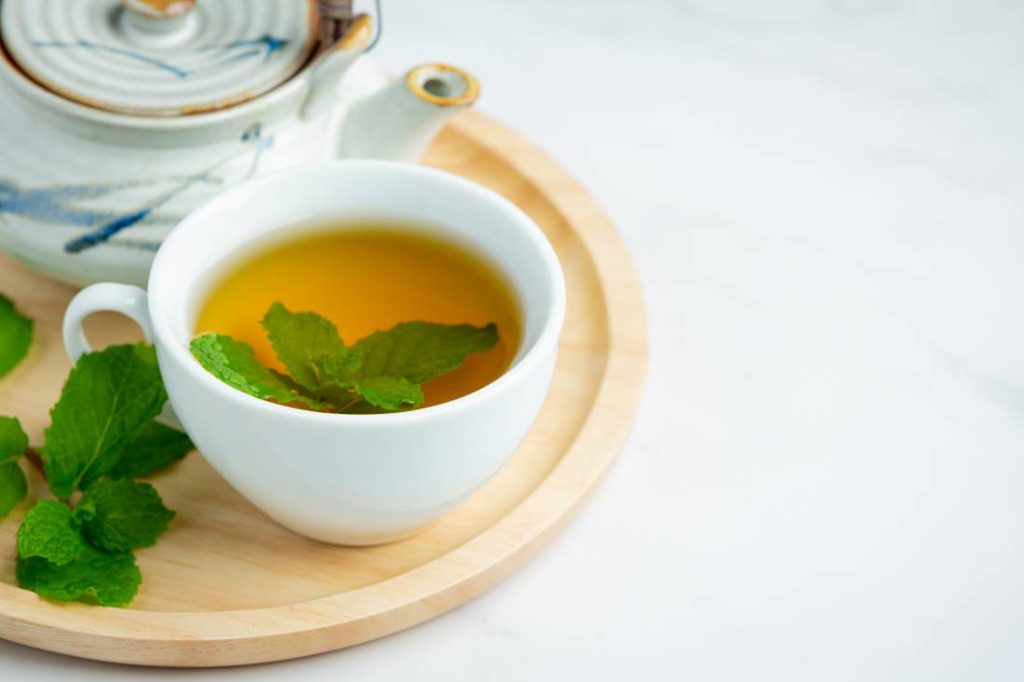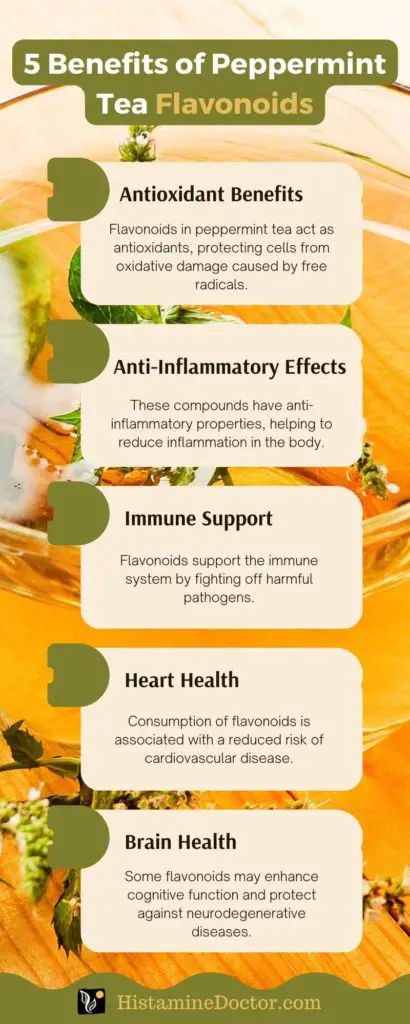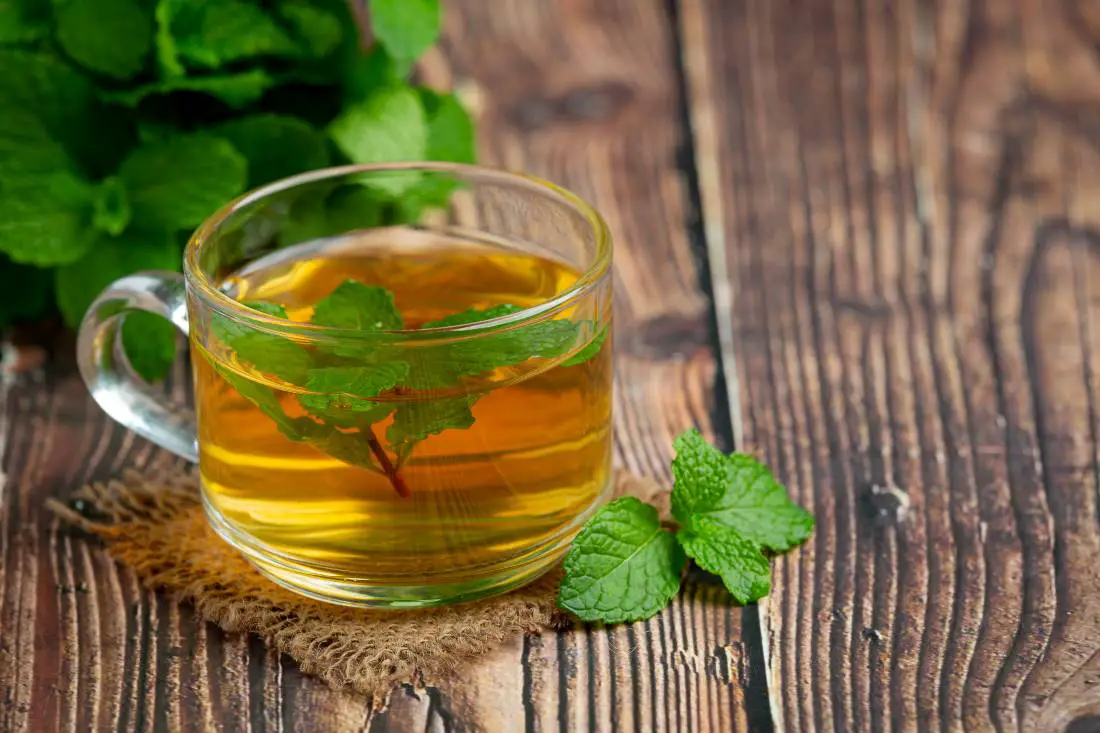Are you looking for low histamine tea that won’t aggravate your histamine intolerance symptoms?With its unique “peppy” flavor, peppermint tickles the taste buds like no other.
Even the aroma of peppermint is powerful. That powerful aroma comes from a high concentration of chemicals called terpenes, which are the molecules that give some plants their scent.
But if you have histamine intolerance, you’re probably asking the obvious question. Is peppermint tea high in histamine?
Herbal Tea and Histamine Intolerance
If you have histamine intolerance, you know that black tea can be a problem because it’s fermented. So, it doesn’t quality as a low histamine tea. In contrast, peppermint tea is an herbal tea, and doesn’t come from the leaves of the C. seninsis plant like black tea. Plus, it isn’t fermented.
Peppermint tea is also caffeine-free. If you have histamine intolerance, caffeinated beverages can be a problem, as caffeine blocks diamine oxidase, the main enzyme that breaks down histamine. That’s why most people with histamine intolerance limit caffeinated beverages. Although modest quantities of green tea and white tea (lower in caffeine) may be tolerable.
Some herbal teas are a tasty alternative to traditional tea, as long as you choose ones that aren’t high in histamine and are unlikely to trigger histamine intolerance symptoms, like caffeinated tea can. There’s some evidence that caffeine increases sensitivity to histamine by up-regulating histamine receptors. (5)

Is Peppermint Tea High in Histamine?
When you sip a cup of peppermint tea, it cools your mouth almost like a dinner mint. It cleanses the palate and has a light, refreshing flavor. Peppermint is a blend of two types of mint. One is spearmint and the other is water mint. Spearmint tea is another popular herbal tea, but peppermint has a “peppier” flavor.
There’s no evidence that peppermint tea is high in histamine. Therefore, most people can enjoy it on a low-histamine diet without fear of triggering histamine intolerance symptoms.
Some studies even show peppermint improves digestion and the symptoms of irritable bowel syndrome. (1, 8) Plus, its minty flavor is a natural panacea for nausea. (2) Even the aroma calms the tummy.
But there are some downsides too. Some research shows peppermint worsens the symptoms of acid reflux. (11) Since many people with histamine intolerance also have acid reflux, approach peppermint tea with caution if you have frequent heartburn, reflux, or gastroesophageal reflux. (GERD) Be aware that caffeinated beverages, particularly coffee, can also worsen acid reflux.
Does Peppermint Tea Have Anti-Inflammatory Benefits?
In terms of histamine content, peppermint tea is a low-histamine tea that may be of benefit if you have histamine intolerance. Peppermint contains rosmarinic acid, a chemical compound with anti-inflammatory, antioxidant, anti-bacterial, and antiviral activity. (4)
Some functional medicine physicians use rosmarinic acid to treat allergic conditions, like allergic rhinitis and asthma due to its anti-inflammatory properties.
One study found supplementing daily with rosmarinic acid vs. a placebo for 21 days reduced the number of cells and inflammatory chemicals in nasal secretions of seasonal allergy sufferers. (6)
At the very least, the aroma helps open up the sinuses. At this point, there’s not enough evidence to say that rosmarinic acid reduces allergy symptoms or improves histamine tolerance, but the study is intriguing.

Is Peppermint Tea an Antihistamine?
Could peppermint tea be an antihistamine? If it has antihistamine activity, it could help counter histamine intolerance by reducing the effects of histamine. There is some research to suggest that peppermint tea has anthistamine properties.
Although this research was carried out on rats, a study also found that a 50% extract from the leaves of the peppermint plant blocked the release of histamine from mast cells in rats.
When they challenged the rats by exposing them to proteins that trigger allergy symptoms, peppermint extract reduced their allergy-related nasal symptoms. (8)
Researchers in the study pointed out that extract from peppermint leaves could reduce nasal symptoms associated with allergies, like sneezing, itching nose, runny nose etc.
In the study, the benefits were dose dependent, so it’s unlikely that drinking a cup of peppermint tea every day would be enough to treat allergy symptoms.
Still, it shows that peppermint tea is unlikely to worsen histamine intolerance symptoms and may offer some benefits.
Also, discover more about antihistamine tea and which types are best.
Peppermint Leaves Also Contain Flavonoids
Peppermint leaves, along with rosmarinic acid, also contain flavonoids with antioxidant and anti-inflammatory activity. (8) When you steep the leaves in hot water, these components enter the water and you get the benefits when you sip a cup of peppermint tea.
Studies also show that peppermint has anti-bacterial and anti-fungal activity. (10) But most importantly, it’s a low histamine tea alternative.

Is Peppermint Tea Okay on a Low-Histamine Diet?
Is peppermint tea high in histamine? It’s unlikely that peppermint tea worsens histamine intolerance symptoms. I’ve talked to patients who claim sipping several cups of peppermint tea helps their histamine sensitivity symptoms, especially those with nasal symptoms.
As always, keep a food diary if you add peppermint tea to your diet and see how you respond. Also, be sure you’re buying herbal peppermint tea. Some companies sell black tea mixed with or flavored with peppermint. Since black tea is fermented, it’s one to avoid, as it’s not a low histamine tea.
Who Should Not Drink Peppermint Tea?
Avoid drinking peppermint tea if you have acid reflux, as peppermint relaxes the flap that separates your stomach and esophagus and can worsen reflux symptoms. You should also avoid drinking peppermint tea if you have an active stomach ulcer.
If you’re taking medications, you should also talk to your doctor before drinking large quantities of peppermint tea. Otherwise, consume it in small quantities at first and see how your body responds to it.
References:
- Khanna R, MacDonald JK, Levesque BG. Peppermint oil for the treatment of irritable bowel syndrome: a systematic review and meta-analysis. J Clin Gastroenterol. 2014 Jul;48(6):505-12. doi: 10.1097/MCG.0b013e3182a88357. PMID: 24100754. https://pubmed.ncbi.nlm.nih.gov/24100754/
- Tayarani-Najaran Z, Talasaz-Firoozi E, Nasiri R, Jalali N, Hassanzadeh M. Antiemetic activity of volatile oil from Mentha spicata and Mentha × piperita in chemotherapy-induced nausea and vomiting. Ecancermedicalscience. 2013;7:290. doi: 10.3332/ecancer.2013.290. Epub 2013 Jan 31. PMID: 23390455; PMCID: PMC3562057.
- Antiallergic activity of rosmarinic acid esters is modulated by hydrophobicity, and bulkiness of alkyl side chain. Fengxian Zhu,Zhongming Xu,Lina Yonekura,Ronghua Yang &Hirotoshi Tamura. Pages 1178-1182 | Received 25 Nov 2014, Accepted 13 Jan 2015, Published online: 16 Feb 2015.
- Luo C, Zou L, Sun H, Peng J, Gao C, Bao L, Ji R, Jin Y, Sun S. A Review of the Anti-Inflammatory Effects of Rosmarinic Acid on Inflammatory Diseases. Front Pharmacol. 2020 Feb 28;11:153. doi: 10.3389/fphar.2020.00153. PMID: 32184728; PMCID: PMC7059186.
- Neuroscience Letters. Volume 668, 6 March 2018, Pages 60-66
- Osakabe N, Takano H, Sanbongi C, Yasuda A, Yanagisawa R, Inoue K, Yoshikawa T. Anti-inflammatory and anti-allergic effect of rosmarinic acid (RA); inhibition of seasonal allergic rhinoconjunctivitis (SAR) and its mechanism. Biofactors. 2004;21(1-4):127-31. doi: 10.1002/biof.552210125. PMID: 15630183. https://pubmed.ncbi.nlm.nih.gov/15630183/
- Inoue T, Sugimoto Y, Masuda H, Kamei C. Effects of peppermint (Mentha piperita L.) extracts on experimental allergic rhinitis in rats. Biol Pharm Bull. 2001 Jan;24(1):92-5. doi: 10.1248/bpb.24.92. PMID: 11201253.
- McKay DL, Blumberg JB. A review of the bioactivity and potential health benefits of peppermint tea (Mentha piperita L.). Phytother Res. 2006 Aug;20(8):619-33. doi: 10.1002/ptr.1936. PMID: 16767798.
- “Peppermint antioxidants revisited – ScienceDirect.” 01 Jun. 2015, https://www.sciencedirect.com/science/article/pii/S030881461401930X.
- Journal of Medicinal Plants Research Vol. 6(2), pp. 331-335, 16 January, 2012. Available online at http://www.academicjournals.org/JMPR. DOI: 10.5897/JMPR11.1232. ISSN 1996-0875 ©2012 Academic Journals
- Jarosz M, Taraszewska A. Risk factors for gastroesophageal reflux disease: the role of diet. Prz Gastroenterol. 2014;9(5):297-301. doi: 10.5114/pg.2014.46166. Epub 2014 Oct 19. PMID: 25396005; PMCID: PMC4223119.

